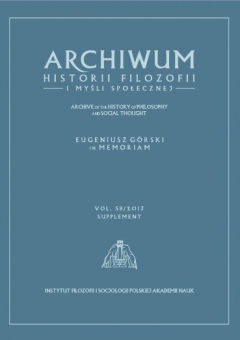Idea et praxis „Teologia wyzwolenia” a działanie i oficjalna doktryna Kościoła katolickiego
Idea and praxis “Liberation Theology” versus Activity and Doctrine of the Catholic Church
Author(s): Ryszard StefańskiSubject(s): Christian Theology and Religion, Marxism
Published by: Instytut Filozofii i Socjologii Polskiej Akademii Nauk
Keywords: Catholic Church; Liberation Theology; Marxism; Revolution; Latin America;
Summary/Abstract: The study presents the origin and development of “liberation theology” and the attitude towards it of the Holy See. It can be assumed that the social background for that theology came from the legitimizing by the state authorities of misery and quasi-captive exploitation of millions of Latin American inhabitants by a handful of great landowners. And the ideological background of it lies, on the one hand, in the official doctrine of the Catholic Church represented by John XXIII and Paul VI (The Constitution Gaudium and spes, the Encyclicals Mater et magistra, Pacem in terris, Populorum progressio) and on the other hand in Marxism. A radical change in that attitude took place along with the advent of John Paul II. The “Liberation Theology” was condemned by the Church Congregation and by the Pope himself in the Encyclical Sollicitudo rei socialis. John Paul II who intransigently settled matters with the liberation theology does not suit somehow to the image of a forgiving, tolerant and smiling man. Responsible for that image is on the one hand a popular journalism, and on the other hand a prolonged concentration of Polish researchers on John Paul II’s contribution to the process of dismounting the Yalta system.
Journal: Archiwum Historii Filozofii i Myśli Społecznej
- Issue Year: 2013
- Issue No: 58supl.
- Page Range: 257-275
- Page Count: 19
- Language: Polish

